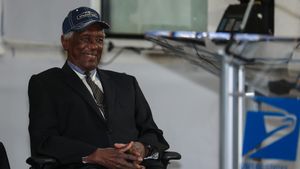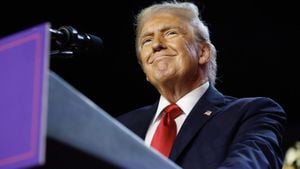Donald Trump, gearing up for his second presidency, has made significant moves to reshape his administration's trade strategy. His most recent announcement, made during the Thanksgiving week, is the selection of Jamieson Greer as the new United States Trade Representative (USTR). This decision highlights Trump's commitment to addressing America’s trade issues with countries like China, Canada, and Mexico, particularly as he plans to implement aggressive tariff measures from day one.
Greer, known for his previous role as chief of staff to former USTR Robert Lighthizer during Trump's first term, brings valuable experience to the table. Having been involved extensively with trade negotiations, particularly those leading to the United States-Mexico-Canada Agreement (USMCA) and the Section 301 duties imposed on China, Greer is positioned as a key player to drive the administration's trade policy forward.
On his social media platform, Truth Social, Trump stated, "Jamieson Greer played a key role during my first term and is dedicated to fighting for American workers and businesses." Greer has asserted his commitment to tackling the substantial trade deficit faced by the U.S. and promises to prioritize the interests of American manufacturers. Trump's choice reflects his continued focus on using tariffs as leverage against foreign nations, asserting this will strengthen American economic standing globally.
Throughout his campaign, Trump emphasized his readiness to impose significant duties on imports from China. Initially pledging tariffs of up to 100%, he seems to have moderated this stance recently. Now, he indicated plans for initial tariffs of 10% on any additional tariffs after he takes office. Trump stated during his campaign, "America should be manufacturing more of the products we use," positioning both Greer and his upcoming policies as pivotal to restoring domestic production.
Analysts expect Greer’s tenure will mirror the aggressive tactics seen during Trump's first term, particularly concerning China. Greer has openly criticized China’s economic ambitions, labeling them as a "generational challenge" for the U.S. During previous testimonies, he pointed out the failures of trade investments with China to meet expectations and advocated for stricter controls on U.S. investments flowing to China, bolstering the notion of strategic decoupling.
Concerns have also been raised about how these proposed tariffs could affect American consumers. Critics suggest they might lead to increased prices on everyday goods, contradicting Trump’s promise to reduce costs for American families. Economists warn these moves could provoke retaliation from affected countries, likely igniting another round of trade disputes similar to those seen during Trump's previous presidency.
With Greer at the helm of the USTR office, his current role will be pivotal as the U.S. faces continued scrutiny from its trading partners. The incoming administration has expressed its intent to revisit the USMCA negotiations, which may come under review as part of Trump's broader strategy to leverage American interests more effectively.
Despite Greer's strong ties with Trump and Lighthizer, questions linger about the exact authority he will wield alongside Howard Lutnick, Trump's pick for Commerce Secretary. Although Trump indicated Lutnick would oversee the USTR office, this arrangement raises legal concerns about the separation between the Cabinet agency and the USTR, which operates as part of the executive office of the president.
Senate Finance Committee members have expressed optimism about Greer’s nomination. Senator Mike Crapo remarked, "Jamieson has extensive trade policy experience and will be a key partner as we work to craft smart trade agreements." He stressed the need for trade policies serving to benefit American farmers, manufacturers, and service providers.
Greer's experience also includes his law practice at King & Spalding, where he worked on international trade matters. His extensive background covers trade remedies, compliance, and negotiation strategies, which will be invaluable as the administration deals with complex trade relations.
All eyes now turn to the Senate confirmation process, where Greer will likely face questions on his ability to navigate the contentious waters of international trade policy. His advocacy for tariffs and strict trade measures will be hot topics as policymakers explore the impact of these regulations on both the economy and American consumers.
The appointments Trump has made so far — including naming Kevin Hassett as director of the National Economic Council — signal his strategy to build out a team focused on economic revival and restructuring trade dynamics. Both Greer’s past experience and Trump's clear directive on trade policy shape expectations for the administration's next steps.
Overall, Greer’s nomination could redefine U.S. trade relations under Trump's administration, as he aims to reignite economic competitiveness and streamline efforts to expand export markets. The coming months will be decisive for how these strategies translate to reality, the likely impacts on American companies, consumers, and the nation's standing on the global stage.



